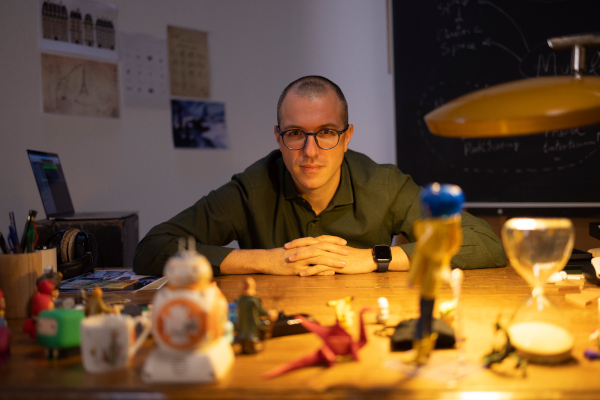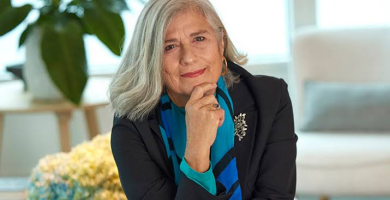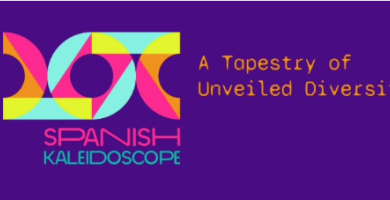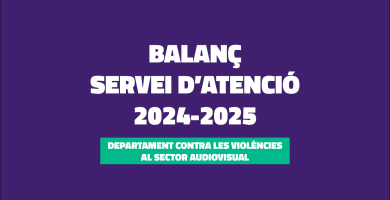
GERARD PASTOR: "As film composers, we try to be very flexible. If the director knows that you have a very broad palette of resources, they rely on you, because they know that you’ll find solutions for them. The music has to be right for the film."
This month we interview Gerard Pastor, a composer, director and pianist with a notable career as a composer for the cinema who has created soundtracks for films such as Sinjar, Sonata para violonchelo, The Mexican Suitcase and Jean-François and the Meaning of Life.

You did the live music for the 1929 film Dans la nuit by Charles Vanel. It was during the visit by Thierry Frémaux, director of the Cannes Festival to the Oh la la! Festival. What was the experience like? It was the first time that you were doing it.
Very intense and very nice at the same time. In general, formerly pianists who did this often improvised live. When they knew the film more, they prepared a certain repertoire. I come from a background as a composer for traditional films, making the film with time, thinking what you want to achieve and how you want to achieve it. I thought it would be easier to decide, but it wasn’t. A lot of it is open, but I really had to prepare it great deal. I was surprised by how long it took. Above all, this sensation of not knowing whether or not people will like what you’re doing. When we make music for a film we have constant feedback from the director or the producers. When you finish it and you present it, there are already a lot of people who have listened to it. This is like premiering something that nobody knows, just a few tests that we did. And then it’s an adventure, like throwing yourself into the unknown. Although it’s very rewarding.
When did your interest in film music begin?
I don’t remember a specific moment. I really liked the Disney soundtracks. My parents or Father Christmas gave me the CDs of Aladdin, Beauty and the Beast, The Little Mermaid,... I’ve got it all. I’d always liked film music a lot, until when I was 14 or 15 I saw Episode 1 of Star Wars with the music by John Williams. Although I’d already listened to John Williams, it was like I was stuck to my cinema seat. With the “Duel of the Fates” I thought: “what on earth is this?” My parents said to me: “come on, we’re going” and I replied: “just a moment. There’s still music with the credits”. I was very impressed and that’s when I said: “I want to do what that man does”. Despite the fact that I’ve done many things, film music always accompanies me, whatever I do.
You’ve done soundtracks for films such as The Mexican Suitcase by Trisha Ziff with the composer Michael Nyman. What did your work consist of and how did you come to be with her? What was the experience of working with Michael Nyman like?
They called me from Mallerich Films Paco Poch, to tell me they needed a composer from here to be able to do the music, because it was a coproduction between Spain and Mexico. Typically the two countries distribute the credits. At the same time, the director, Trisha Ziff, was a friend of Michael Nyman who was also one of the producers. The documentary had some music which was very good for Michael Nyman and other types which weren’t his style, precisely the bolero which accompanies the suitcase and certain things more linked to the setting. It was quite easy to say: “you do this and he’ll do that”. I was very young; I was starting out and everything more or less needed his approval. In the end it all went very smoothly and it was quite an experience. Just imagine: I was 24 or 25 and suddenly I was there with Michael Nyman. It was a complicated project, because the director went into great detail. She made small changes, but a small change in the editing can mean starting again with the music, because everything has a consequence and the music can’t stay the same when you change the pieces. In this respect, it was laborious, but it was a very nice project. My first big project in the industry. From there I went to San Sebastián and to different festivals. I started to see what this was all about and here we are now.
How do you work on a soundtrack? With the finished film?
Theoretically, on paper and on the academic level, what they tell you is that you work with the finished edit, but when it comes to it I’ve only done one film like that. The last one, Mamma qui comando io by Federico Moccia which will be released next year. In general it hasn’t been like that with the others: some are musical subjects, such as Sonata para violonchelo, for which you have to do the music and then they have to do playback to this music. With Jean François and the Meaning of Life, Sergi Portabella wanted music before shooting, because he was editing as he shot and he wanted to already have the music. It was nice with that one because he edited with the music to see where something was wrong, he changed it and they still went back to the editing room to make sure everything was right. As it was “square” Baroque music you didn’t have the flexibility of taking out half a second; you had to take out a measure, which is three seconds. Sergi understood this really well. It’s a fantastic soundtrack. With Sinjar I also came in during the editing, but because Anna M. Bofarull wasn’t sure that the film would have music. When the first editing was done, we had a viewing and I told her that it had to have music and why. I made a proposal of 28 min and she replied with a proposal of 42 minutes of music. So, in the end, she saw it as well. I tell my students that there isn’t one method which is better than another; everything’s valid. Even the big film composers do it like this. Some come in during the final editing and in two weeks they have it done, or like John Williams who does it in pieces, they don’t see the editing and it’s edited with the music that’s already been done. Each project is different.

As you mentioned, you have also worked on films by Anna M. Bofarull such as Sonata para violonchelo and Barcelona 1714. How did this collaboration arise?
Together we’ve done three feature films, three documentaries and also a project in an amusement park. There we exchanged roles. I was the project director and she was the screenwriter. I like to work with people I know because I know we’ll get on. As film composers, we try to be very flexible and, in this respect, if you’re flexible and the director knows that you have a very broad palette of resources, they rely on you, because they know that you’ll find solutions for them. The music has to be right for the film. I don’t come along as Gerard Pastor and add my style of music with my artistic signature. My style isn’t the same in Sonata para violonchelo as in Barcelona 1714 or in Sinjar. Not at all. In this respect, we’ve always got on well; the dialogue is very constructive. We’re also friends on a personal level. There’s a part of it which is very natural. She knows that if at any time I think that for her project it will be better with someone else or with me just supervising, there is complete trust on both sides. Anna takes great care of the team with which she gets on; she likes to work with these people. When you already know how they work, you know that the next film will be smoother. Everybody ends up really happy on working with her. I always say that she’s my director.
What difficulties do you encounter when you have to compose a soundtrack?
Less now, but in the beginning it was very difficult for me to abandon very good ideas. An idea might be very good musically, but it doesn’t work for the film and you have to be able to discard a lot of good material. Then, initially it’s also very difficult to understand that the film is a joint project, that you are just one more person and that that’s what is so beautiful. It’s not my ego, to think that my signature is diluted or compromised. No, not at all. It’s to understand that you’re part of a whole. There’s a phrase that I really liked by Conrado Xalabardel, a journalist and soundtrack critic, which says: “it’s very important that the composer always bears in mind the idea of: ‘what can I do for the film?’ And not: ‘what can the film do for me?’” You have to understand this joint universe and the pressure that directors and producers are under. Your idea is completely different to what it’s going to be transferred to. You have to understand that there are lots of pieces and that you’re just one of them. That’s what was the strangest for me at the beginning. In the world of music they commission a piece from you, you do what you think is right and if someone doesn’t like it that’s their problem (laughs). Not here; you have to feel that you are part of this whole. That’s why I like to be sent the script. Even if it’s inspired by the novel, I read it, even if it’s the type of literature that I’d never read. If it’s possible to go to the shoot then I go. I obviously go when they do the sound and music mixing, although that’s the responsibility of the sound technician. I really like to be in command of the whole process.
What attracts you to a project?
First the story, on both a moral and a social level. Once they offered me a subject which they sold as a gateway to doing an American production. But I didn’t agree with it. It was an anti-abortion documentary. I’m pro-abortion with all the necessary healthcare conditions. You have to be careful at what price and where you put your name. That’s important to me. Luckily I’ve only had to say no to a couple of projects.
It also depends on who’s behind it and what quality they want. For example, each year I do one or two shorts with students. In general composers do shorts without being paid. If there’s money what they do is invest it in production. You work with a 22-year-old director who’s starting out and what you want is for them to receive training, and there isn’t a lot of work on the musical part in general in film schools. There you don’t look at it much. You give your support, and often they ask your opinion as they know that you’ve been doing it for years. But, starting from a certain level or certain circuits, I don’t keep my mouth shut. Once, not long ago, they passed me an extremely long, foreseeable short which was very boring for me and I said that it was very good, but that it shouldn’t last 27 minutes, but rather 15 maximum and that if it lasted that long I would do it. They didn’t even reply. And I understand, but luckily I’m going through a moment with a lot of work. And, above all with film, I want what I receive to be something which really enriches me and to which I feel that I can contribute something. And that all together we’re building a project that it’s worth doing. There comes a time when there are things that you don’t feel like doing. And I’m lucky to be able to refuse.
And the timing is also really important. We’ve founded the Barcelona Film Composers Collective, made up of four composers: Xavi Capellas, me, Natasha Arizu and Anna Campmany. Two women and two men from different generations but who get on really well. We decided to do this to support each other. Not just doing things individually. Often there really is a team working: an orchestrator, additional music or someone prepares musical structures and someone else the final result. Like we did with Iván Palomares in The Cook of Castamar. He’s the composer, but it’s a series with many chapters; he had two series and two films at the same time and Iván needed help. He said to me: “I need this”. I did a musical foundation, like the typical beat of modern music, but in Baroque. We recorded it with an orchestra and then with that he could create a puzzle or collage onto which he could add melodies. It gave him an extra tool. And also, if I receive a project and it doesn’t fit in with my diary, as often film music has very specific timings, maybe Xavi, Anna or Natasha can do it.
You’ve also composed for other audiovisual projects, such as video games, immersive shows, theme parks. Is there much difference when undertaking this type of project?
The main difference is the time aspect. With a film, the beginning and the end are defined and they’re always the same. With a video game or an escape room you don’t know how long people will take to change rooms or screens. With an amusement park you don’t know how long people will be in the queue. Also, with the added difficulty that with a video game or an escape room, you need to personalize it or prepare the changes for a specific group or a character or an amusement; you have to increase the tension from the beginning to the end, but the groups are different. Maybe one group will take two hours, and others 40 minutes. What I liked the most was that it made us knock down the walls of the time aspect and think of how to do the music for this format. You have to think about how to create the architecture for all this before starting. In the end it’s music for audiovisual: museums, amusements, thematic areas, apps, adverts, etc. For everything. Each one has its own specific characteristics, but it’s true that cinema, films, series and adverts, everything which is a closed video is one thing and the rest, which is open time, is another way of thinking. That’s the main barrier.
Your last work is Mamma qui comando io by Federico Moccia. What can you tell us about it?
It’s a soundtrack with the composer Bruno Franquet. I’ve composed a lot with other composers. With Adri Mena we did Lunático by Eduard Sola. In this one, apart from the music with Bruno, there’s a whole series of Italian pop-type singers who did certain songs. It’s an entertaining, Christmas, family film to have a bit of a laugh. It was fun. It’s a different project. I hadn’t done any other comedy. Jean François and the Meaning of Life has this constant smile, but this one is perhaps more of a comedy. It was also strange working with Federico Moccia, because he sometimes directs, but he’s more of a writer. He’s the sort of person who, when he tells you things, you can see that he’s a writer.
Have you got any other projects under way that you can talk about?
Now with the Barcelona Film Composers Collective we’re trying to make ourselves known. We’re holding a promotional campaign, because we think we could get some good projects. We’re trying to do the whole circuit of major festivals this year. We started with the Berlinale. It’s going well for us; we’ve made some very interesting contacts and we’re talking about projects. This is a sign that people like the idea.
On a more personal level, I’m now working above all with amusement parks. We’re finishing a park in Qatar, Doha, in a sort of big shopping centre. We’ve done the characters, the story, the video production, all with stop-motion. It’s been terrific. We’re trying to promote stop-motion more within the amusement park industry. We started to collaborate with the Casa Batlló, helping to make the new experiences that they’re creating with night-time visits more immersive, with the lighting and how to integrate the music. I collaborate a lot with the Franz Schubert Filharmonia orchestra. Now in June I’m going to direct the production "Marvel vs DC in concert” again; I also did all the transcriptions and orchestrations, because many scores can’t be found and you have to take down dictation. It was a huge job. I also collaborate quite a lot with the La Caixa Foundation, with two concerts that they do each year in the Liceo and the Teatro Real in Madrid. I’ve been doing the special arrangements that they need for a couple of years, a version of a Christmas Carol, or things like that. With the Franz Schubert I’m starting another project in which I have to do orchestrations.
We also have an association with the theme park creative industries. Once a year we have a meeting in a park in Europe and there, for three or four days, the creatives can propose short talks on different subjects and the park shows what it’s doing new. I’m doing the music for all the audiovisual involved, presentation videos, musical interludes for the galas, things like that,... Also, in the gala of the Gaudí awards I did the orchestration, transcription and music for the awards. I hadn’t done music for galas. It’s a question of getting down to it. And I have other projects that I can’t explain for the moment.









